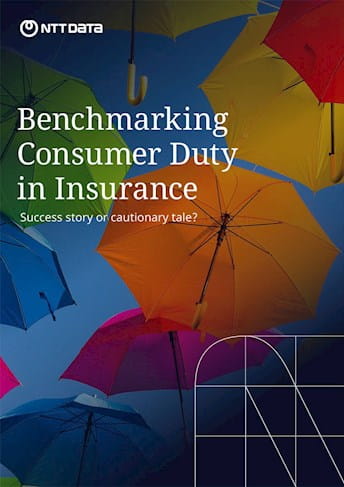Introduction
On 31st July 2024, one year from the Consumer Duty Act coming into force in the UK, firms will have to prove compliance for the first annual board reporting deadline. The Consumer Duty Act (the Duty) requires firms to secure positive outcomes for customers, ensure that products and services meet policyholders’ needs, and deliver clear benefits through fair, transparent, and supportive practices.
Notably, the implementation deadline for closed books of business is also approaching on 31st July 2024. This extension for closed products and services was designed to help firms manage implementation while continuing to advance their work on open products, presenting both challenges and opportunities for insurers to review and improve their practices across their entire portfolio.
However, despite the introduction of the Consumer Duty, NTT DATA research shows 82% of consumers report no change in their interactions with their insurance providers,highlighting a critical area for improvement. When it comes to understanding policies, neurodivergent individuals face challenges, with 29.27% reporting difficulty in obtaining the necessary information, compared to 18% of nonneurodivergent individuals.
Only 27.7% of respondents have taken out new policies in the past six months, signalling potential barriers to product uptake or a lack of attractive offerings. Moreover, 57% of consumers doubt their insurers act in their best interests, indicating a significant deficit in trust.
To address these issues, insurers need to interact with customers more frequently and in a more personalised, authentic way with the use of AI or other transformative technologies. This approach can help grow the addressable market and reach the massive uninsured customer base in the UK. Currently, consumer sentiment remains lukewarm, with many customers feeling indifferent or dissatisfied with their provider or policy.
This report evaluates the impact of Consumer Duty on the insurance industry and its interaction with consumers. It comprises research conducted six months after the Consumer Duty came into force, surveying a representative sample of 2,000 UK consumers who possess one or more active insurance policies, along with recommendations for insurers to put these findings into action.
Artificial Intelligence (AI) in customer service is another focal point. While AI can potentially enhance service delivery and personalisation, there are considerable consumer concerns about its efficacy and the potential loss of human interaction. This report explores these concerns and offers recommendations for better integrating AI into customer service without sacrificing the human touch.


